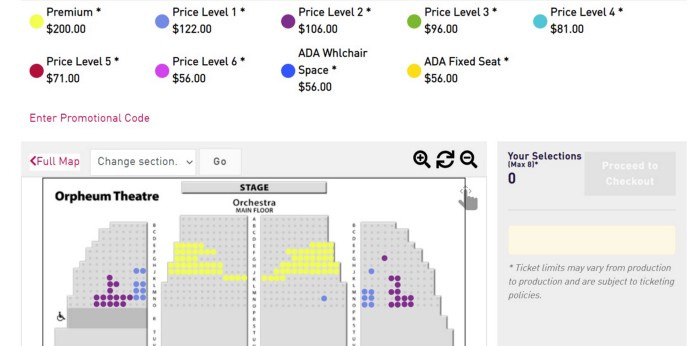You should NOT be able to resell accessible seating tickets.
You must certify that you have a disability to buy an ADA ticket. Why should you be able to resell it at an inflated price to someone without a disability?
Tickets for Rent: ADA tickets are $56 even though non-ADA seats next to it are $106 and seats a couple of seats more to the center are $200
In the US, public shows such as sporting events, live theater, and concerts must set aside a certain number of tickets for people with disabilities. This is commonly called “Wheelchair seating” or sometimes “ADA seating.”
Most of the time, as part of the checkout process for buying ADA seats you need to certify that you, or someone in your party, has a need for an accessible seat. It’s a self-certification. No medical documentation is required.
Why? Because ADA seating is generally priced at the lowest ticket price in the house. It is not the fault of the person who uses a wheelchair that most venues don’t bother with wheelchair-accessible seats in the rear side balcony, which are generally the worst, and thus cheapest, seats in the house. Therefore, venue owners typically charge whatever is their lowest ticket price for accessible seating, regardless of where the accessible seats are located. That way, they can’t be accused of discriminating by forcing wheelchair users to pay more when they might actually want lower-quality seats but can’t get them because the venue doesn’t provide them.
That is how people with disabilities can purchase seats for $56 that are spitting distance from premium $200 seats.
What is stopping you from reselling those great accessible seats on the open market at a profit?
Turns out, nothing.
This has been fairly obvious to me over the years because I don’t remember ever seeing another wheelchair user in accessible seating at theater events and only one other wheelchair user at an SF Giants game in the past season. Yes, it is possible that the individuals I was sitting with had hidden disabilities such as heart problems or lung conditions. But at every single event, I’ve been to for the last five years except one? The statistics are not in favor of that being true.
I ran across this story in the news which reinforced what I had been subconsciously thinking all along: someone is gaming the system.
Not every venue prices accessible seats at the lowest value in the house, some price them higher, which is wrong, and probably an ADA violation, and;
There is a secondary market that enables reselling cheap accessible seating for much higher amounts of money.
The article stated that in one case, accessible seats were priced on a resale market at more than 575 % higher than regular seats in the same area.
It is very clear that someone is trying to make a buck off of reselling accessible seating.
For example, tickets to the For King and Country concert at the Yum! Center in section 113 were listed at $46 on SeatGeek. Accessible seats in the same section were listed for $265.
We reached out to SeatGeek for an explanation and they said there’s no way to regulate what resellers choose to price tickets.
If you buy ADA seating and you don’t have a disability, you are committing fraud.
If you buy ADA seating on the secondhand market and you don’t have a disability, you may also be committing fraud.
Every time someone buys ADA seating and resells them at an exorbitant price to someone who really needs accessible seating, the party selling the tickets is acting in a highly unethical manner. If the seller lied about having a disability to buy the tickets at a lower price and resell them to make a profit, then that is a fraud as well.
Rather than blaming the reseller and whining about there being nothing that venues can do, why don’t venues focus on what they CAN do? Turns out there are plenty of actions they can take that are well within their power.
Print the ADA restrictions on the ticket. For venues that handle ticket transfers themselves, ask the party receiving the tickets to again re-certify their disability status.
Have ushers ask whether there is a member of the party that is disabled when seating individuals. You can’t ask for more details than that, and you need a plan of action if the answer is no.
Make the ADA tickets refundable, even if the rest of the tickets are “no refunds allowed.” That way, if something comes up, the disabled individual who bought the tickets can get their money back and isn’t motivated to sell them on a secondary market. The venue can then put the tickets back in inventory and resell them to another disabled individual.
Make the ADA tickets not transferrable. That way, only the original purchasers who have attested to their disability seating needs can use them.
This Article is copyrighted by Access*Ability, an imprint of AccessibilityBlueprint.com, please contact us for permission before quoting or linking our articles by emailing info@accessibilityblueprint.com


